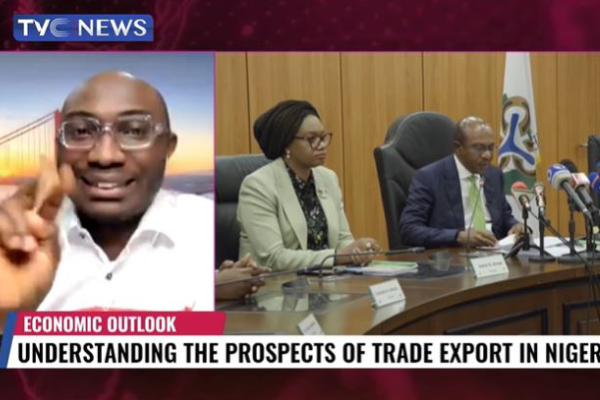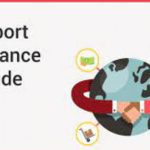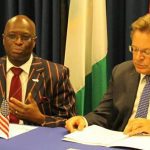The obstacles that those involved in the export business in Nigeria face, according to Dr. Bamidele Aiyemibo, a consultant and financial expert, are multifaceted.
Speaking to Tolulope Ogunjobi of TVC News’ Business Nigeria program, Dr. Aiyemibo said the poll revealed a number of intriguing findings, particularly in terms of their access to funding.
[wonderplugin_video iframe=”https://youtu.be/7-oNcVBEvrw” lightbox=0 lightboxsize=1 lightboxwidth=960 lightboxheight=540 autoopen=0 autoopendelay=0 autoclose=0 lightboxtitle=”” lightboxgroup=”” lightboxshownavigation=0 showimage=”” lightboxoptions=”” videowidth=600 videoheight=400 keepaspectratio=1 autoplay=0 loop=0 videocss=”position:relative;display:block;background-color:#000;overflow:hidden;max-width:100%;margin:0 auto;” playbutton=”https://www.tvcnews.tv/wp-content/plugins/wonderplugin-video-embed/engine/playvideo-64-64-0.png”]
According to him, the poll also revealed that Small and Medium Scale Enterprises (SMEs) must be promoted as a critical tool in increasing Nigerian exports.
He added that the findings corroborated the views expressed by the governor of the Central Bank of Nigeria, Mr Godwin Emefiele, at a recent Bankers Committee meeting on the importance of assisting Small and Medium Scale Enterprises in increasing capacity and access to financing and other value-added services.
He stated that banks must be creative in providing other support services outside finance, such as trade intelligence and market services.
He added that the exporters also requested services to address their primary issues with the export process, such as port logistics, financing, and delays in dealing with government authorities.
He believes that having export terminals outside of the current recognized Port facilities and complexes across the country can address this.
On whether Nigerian exporters are ready to compete in the export market, he stated that based on the information he has, Nigerian exporters are not ready.
He mentioned a 2020 poll of 120 Nigerian business entities participating in the export business, with only 4% of them ready to participate in the export business.
He went on to say that this is one of the main reasons why the Ecowas trade liberalisation project has failed to this day.
He went on to say that even after 30 years, several Nigerian businesses are unaware that the ETLS does not exist.
The obstacles that those involved in the export business in Nigeria face, according to Dr. Bamidele Aiyemibo, a consultant and financial expert, are multifaceted.
Speaking to Tolulope Ogunjobi of TVC News’ Business Nigeria program, Dr. Aiyemibo said the poll revealed a number of intriguing findings, particularly in terms of their access to funding.
[wonderplugin_video iframe=”https://youtu.be/7-oNcVBEvrw” lightbox=0 lightboxsize=1 lightboxwidth=960 lightboxheight=540 autoopen=0 autoopendelay=0 autoclose=0 lightboxtitle=”” lightboxgroup=”” lightboxshownavigation=0 showimage=”” lightboxoptions=”” videowidth=600 videoheight=400 keepaspectratio=1 autoplay=0 loop=0 videocss=”position:relative;display:block;background-color:#000;overflow:hidden;max-width:100%;margin:0 auto;” playbutton=”https://www.tvcnews.tv/wp-content/plugins/wonderplugin-video-embed/engine/playvideo-64-64-0.png”]
According to him, the poll also revealed that Small and Medium Scale Enterprises (SMEs) must be promoted as a critical tool in increasing Nigerian exports.
He added that the findings corroborated the views expressed by the governor of the Central Bank of Nigeria, Mr Godwin Emefiele, at a recent Bankers Committee meeting on the importance of assisting Small and Medium Scale Enterprises in increasing capacity and access to financing and other value-added services.
He stated that banks must be creative in providing other support services outside finance, such as trade intelligence and market services.
He added that the exporters also requested services to address their primary issues with the export process, such as port logistics, financing, and delays in dealing with government authorities.
He believes that having export terminals outside of the current recognized Port facilities and complexes across the country can address this.
On whether Nigerian exporters are ready to compete in the export market, he stated that based on the information he has, Nigerian exporters are not ready.
He mentioned a 2020 poll of 120 Nigerian business entities participating in the export business, with only 4% of them ready to participate in the export business.
He went on to say that this is one of the main reasons why the Ecowas trade liberalisation project has failed to this day.
He went on to say that even after 30 years, several Nigerian businesses are unaware that the ETLS does not exist.
The obstacles that those involved in the export business in Nigeria face, according to Dr. Bamidele Aiyemibo, a consultant and financial expert, are multifaceted.
Speaking to Tolulope Ogunjobi of TVC News’ Business Nigeria program, Dr. Aiyemibo said the poll revealed a number of intriguing findings, particularly in terms of their access to funding.
[wonderplugin_video iframe=”https://youtu.be/7-oNcVBEvrw” lightbox=0 lightboxsize=1 lightboxwidth=960 lightboxheight=540 autoopen=0 autoopendelay=0 autoclose=0 lightboxtitle=”” lightboxgroup=”” lightboxshownavigation=0 showimage=”” lightboxoptions=”” videowidth=600 videoheight=400 keepaspectratio=1 autoplay=0 loop=0 videocss=”position:relative;display:block;background-color:#000;overflow:hidden;max-width:100%;margin:0 auto;” playbutton=”https://www.tvcnews.tv/wp-content/plugins/wonderplugin-video-embed/engine/playvideo-64-64-0.png”]
According to him, the poll also revealed that Small and Medium Scale Enterprises (SMEs) must be promoted as a critical tool in increasing Nigerian exports.
He added that the findings corroborated the views expressed by the governor of the Central Bank of Nigeria, Mr Godwin Emefiele, at a recent Bankers Committee meeting on the importance of assisting Small and Medium Scale Enterprises in increasing capacity and access to financing and other value-added services.
He stated that banks must be creative in providing other support services outside finance, such as trade intelligence and market services.
He added that the exporters also requested services to address their primary issues with the export process, such as port logistics, financing, and delays in dealing with government authorities.
He believes that having export terminals outside of the current recognized Port facilities and complexes across the country can address this.
On whether Nigerian exporters are ready to compete in the export market, he stated that based on the information he has, Nigerian exporters are not ready.
He mentioned a 2020 poll of 120 Nigerian business entities participating in the export business, with only 4% of them ready to participate in the export business.
He went on to say that this is one of the main reasons why the Ecowas trade liberalisation project has failed to this day.
He went on to say that even after 30 years, several Nigerian businesses are unaware that the ETLS does not exist.
The obstacles that those involved in the export business in Nigeria face, according to Dr. Bamidele Aiyemibo, a consultant and financial expert, are multifaceted.
Speaking to Tolulope Ogunjobi of TVC News’ Business Nigeria program, Dr. Aiyemibo said the poll revealed a number of intriguing findings, particularly in terms of their access to funding.
[wonderplugin_video iframe=”https://youtu.be/7-oNcVBEvrw” lightbox=0 lightboxsize=1 lightboxwidth=960 lightboxheight=540 autoopen=0 autoopendelay=0 autoclose=0 lightboxtitle=”” lightboxgroup=”” lightboxshownavigation=0 showimage=”” lightboxoptions=”” videowidth=600 videoheight=400 keepaspectratio=1 autoplay=0 loop=0 videocss=”position:relative;display:block;background-color:#000;overflow:hidden;max-width:100%;margin:0 auto;” playbutton=”https://www.tvcnews.tv/wp-content/plugins/wonderplugin-video-embed/engine/playvideo-64-64-0.png”]
According to him, the poll also revealed that Small and Medium Scale Enterprises (SMEs) must be promoted as a critical tool in increasing Nigerian exports.
He added that the findings corroborated the views expressed by the governor of the Central Bank of Nigeria, Mr Godwin Emefiele, at a recent Bankers Committee meeting on the importance of assisting Small and Medium Scale Enterprises in increasing capacity and access to financing and other value-added services.
He stated that banks must be creative in providing other support services outside finance, such as trade intelligence and market services.
He added that the exporters also requested services to address their primary issues with the export process, such as port logistics, financing, and delays in dealing with government authorities.
He believes that having export terminals outside of the current recognized Port facilities and complexes across the country can address this.
On whether Nigerian exporters are ready to compete in the export market, he stated that based on the information he has, Nigerian exporters are not ready.
He mentioned a 2020 poll of 120 Nigerian business entities participating in the export business, with only 4% of them ready to participate in the export business.
He went on to say that this is one of the main reasons why the Ecowas trade liberalisation project has failed to this day.
He went on to say that even after 30 years, several Nigerian businesses are unaware that the ETLS does not exist.
The obstacles that those involved in the export business in Nigeria face, according to Dr. Bamidele Aiyemibo, a consultant and financial expert, are multifaceted.
Speaking to Tolulope Ogunjobi of TVC News’ Business Nigeria program, Dr. Aiyemibo said the poll revealed a number of intriguing findings, particularly in terms of their access to funding.
[wonderplugin_video iframe=”https://youtu.be/7-oNcVBEvrw” lightbox=0 lightboxsize=1 lightboxwidth=960 lightboxheight=540 autoopen=0 autoopendelay=0 autoclose=0 lightboxtitle=”” lightboxgroup=”” lightboxshownavigation=0 showimage=”” lightboxoptions=”” videowidth=600 videoheight=400 keepaspectratio=1 autoplay=0 loop=0 videocss=”position:relative;display:block;background-color:#000;overflow:hidden;max-width:100%;margin:0 auto;” playbutton=”https://www.tvcnews.tv/wp-content/plugins/wonderplugin-video-embed/engine/playvideo-64-64-0.png”]
According to him, the poll also revealed that Small and Medium Scale Enterprises (SMEs) must be promoted as a critical tool in increasing Nigerian exports.
He added that the findings corroborated the views expressed by the governor of the Central Bank of Nigeria, Mr Godwin Emefiele, at a recent Bankers Committee meeting on the importance of assisting Small and Medium Scale Enterprises in increasing capacity and access to financing and other value-added services.
He stated that banks must be creative in providing other support services outside finance, such as trade intelligence and market services.
He added that the exporters also requested services to address their primary issues with the export process, such as port logistics, financing, and delays in dealing with government authorities.
He believes that having export terminals outside of the current recognized Port facilities and complexes across the country can address this.
On whether Nigerian exporters are ready to compete in the export market, he stated that based on the information he has, Nigerian exporters are not ready.
He mentioned a 2020 poll of 120 Nigerian business entities participating in the export business, with only 4% of them ready to participate in the export business.
He went on to say that this is one of the main reasons why the Ecowas trade liberalisation project has failed to this day.
He went on to say that even after 30 years, several Nigerian businesses are unaware that the ETLS does not exist.
The obstacles that those involved in the export business in Nigeria face, according to Dr. Bamidele Aiyemibo, a consultant and financial expert, are multifaceted.
Speaking to Tolulope Ogunjobi of TVC News’ Business Nigeria program, Dr. Aiyemibo said the poll revealed a number of intriguing findings, particularly in terms of their access to funding.
[wonderplugin_video iframe=”https://youtu.be/7-oNcVBEvrw” lightbox=0 lightboxsize=1 lightboxwidth=960 lightboxheight=540 autoopen=0 autoopendelay=0 autoclose=0 lightboxtitle=”” lightboxgroup=”” lightboxshownavigation=0 showimage=”” lightboxoptions=”” videowidth=600 videoheight=400 keepaspectratio=1 autoplay=0 loop=0 videocss=”position:relative;display:block;background-color:#000;overflow:hidden;max-width:100%;margin:0 auto;” playbutton=”https://www.tvcnews.tv/wp-content/plugins/wonderplugin-video-embed/engine/playvideo-64-64-0.png”]
According to him, the poll also revealed that Small and Medium Scale Enterprises (SMEs) must be promoted as a critical tool in increasing Nigerian exports.
He added that the findings corroborated the views expressed by the governor of the Central Bank of Nigeria, Mr Godwin Emefiele, at a recent Bankers Committee meeting on the importance of assisting Small and Medium Scale Enterprises in increasing capacity and access to financing and other value-added services.
He stated that banks must be creative in providing other support services outside finance, such as trade intelligence and market services.
He added that the exporters also requested services to address their primary issues with the export process, such as port logistics, financing, and delays in dealing with government authorities.
He believes that having export terminals outside of the current recognized Port facilities and complexes across the country can address this.
On whether Nigerian exporters are ready to compete in the export market, he stated that based on the information he has, Nigerian exporters are not ready.
He mentioned a 2020 poll of 120 Nigerian business entities participating in the export business, with only 4% of them ready to participate in the export business.
He went on to say that this is one of the main reasons why the Ecowas trade liberalisation project has failed to this day.
He went on to say that even after 30 years, several Nigerian businesses are unaware that the ETLS does not exist.
The obstacles that those involved in the export business in Nigeria face, according to Dr. Bamidele Aiyemibo, a consultant and financial expert, are multifaceted.
Speaking to Tolulope Ogunjobi of TVC News’ Business Nigeria program, Dr. Aiyemibo said the poll revealed a number of intriguing findings, particularly in terms of their access to funding.
[wonderplugin_video iframe=”https://youtu.be/7-oNcVBEvrw” lightbox=0 lightboxsize=1 lightboxwidth=960 lightboxheight=540 autoopen=0 autoopendelay=0 autoclose=0 lightboxtitle=”” lightboxgroup=”” lightboxshownavigation=0 showimage=”” lightboxoptions=”” videowidth=600 videoheight=400 keepaspectratio=1 autoplay=0 loop=0 videocss=”position:relative;display:block;background-color:#000;overflow:hidden;max-width:100%;margin:0 auto;” playbutton=”https://www.tvcnews.tv/wp-content/plugins/wonderplugin-video-embed/engine/playvideo-64-64-0.png”]
According to him, the poll also revealed that Small and Medium Scale Enterprises (SMEs) must be promoted as a critical tool in increasing Nigerian exports.
He added that the findings corroborated the views expressed by the governor of the Central Bank of Nigeria, Mr Godwin Emefiele, at a recent Bankers Committee meeting on the importance of assisting Small and Medium Scale Enterprises in increasing capacity and access to financing and other value-added services.
He stated that banks must be creative in providing other support services outside finance, such as trade intelligence and market services.
He added that the exporters also requested services to address their primary issues with the export process, such as port logistics, financing, and delays in dealing with government authorities.
He believes that having export terminals outside of the current recognized Port facilities and complexes across the country can address this.
On whether Nigerian exporters are ready to compete in the export market, he stated that based on the information he has, Nigerian exporters are not ready.
He mentioned a 2020 poll of 120 Nigerian business entities participating in the export business, with only 4% of them ready to participate in the export business.
He went on to say that this is one of the main reasons why the Ecowas trade liberalisation project has failed to this day.
He went on to say that even after 30 years, several Nigerian businesses are unaware that the ETLS does not exist.
The obstacles that those involved in the export business in Nigeria face, according to Dr. Bamidele Aiyemibo, a consultant and financial expert, are multifaceted.
Speaking to Tolulope Ogunjobi of TVC News’ Business Nigeria program, Dr. Aiyemibo said the poll revealed a number of intriguing findings, particularly in terms of their access to funding.
[wonderplugin_video iframe=”https://youtu.be/7-oNcVBEvrw” lightbox=0 lightboxsize=1 lightboxwidth=960 lightboxheight=540 autoopen=0 autoopendelay=0 autoclose=0 lightboxtitle=”” lightboxgroup=”” lightboxshownavigation=0 showimage=”” lightboxoptions=”” videowidth=600 videoheight=400 keepaspectratio=1 autoplay=0 loop=0 videocss=”position:relative;display:block;background-color:#000;overflow:hidden;max-width:100%;margin:0 auto;” playbutton=”https://www.tvcnews.tv/wp-content/plugins/wonderplugin-video-embed/engine/playvideo-64-64-0.png”]
According to him, the poll also revealed that Small and Medium Scale Enterprises (SMEs) must be promoted as a critical tool in increasing Nigerian exports.
He added that the findings corroborated the views expressed by the governor of the Central Bank of Nigeria, Mr Godwin Emefiele, at a recent Bankers Committee meeting on the importance of assisting Small and Medium Scale Enterprises in increasing capacity and access to financing and other value-added services.
He stated that banks must be creative in providing other support services outside finance, such as trade intelligence and market services.
He added that the exporters also requested services to address their primary issues with the export process, such as port logistics, financing, and delays in dealing with government authorities.
He believes that having export terminals outside of the current recognized Port facilities and complexes across the country can address this.
On whether Nigerian exporters are ready to compete in the export market, he stated that based on the information he has, Nigerian exporters are not ready.
He mentioned a 2020 poll of 120 Nigerian business entities participating in the export business, with only 4% of them ready to participate in the export business.
He went on to say that this is one of the main reasons why the Ecowas trade liberalisation project has failed to this day.
He went on to say that even after 30 years, several Nigerian businesses are unaware that the ETLS does not exist.














